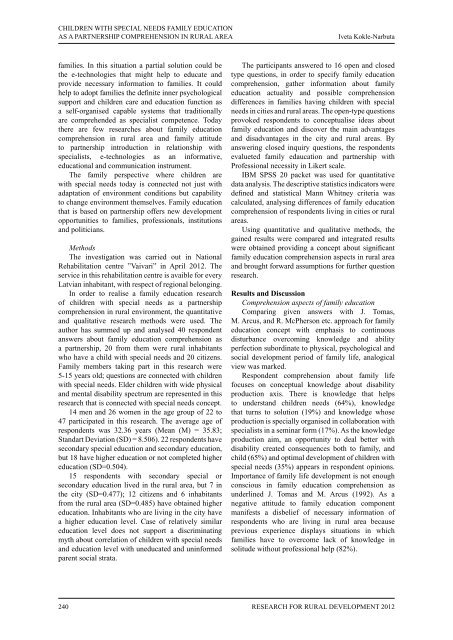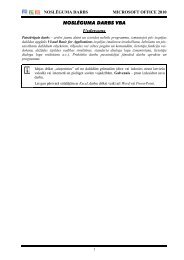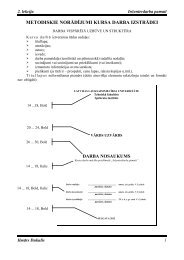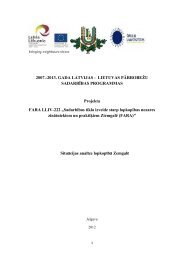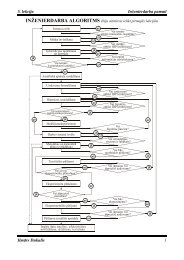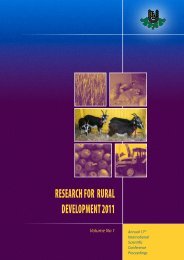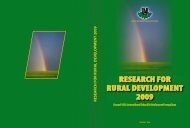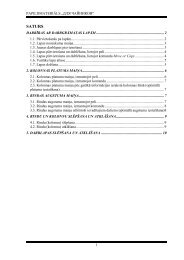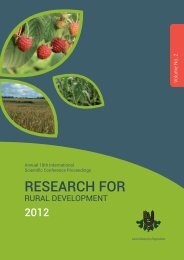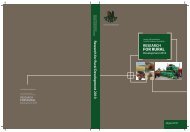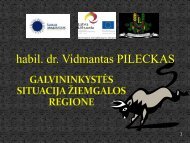LATVIA UNIVERSITY OF AGRICULTURE - Latvijas ...
LATVIA UNIVERSITY OF AGRICULTURE - Latvijas ...
LATVIA UNIVERSITY OF AGRICULTURE - Latvijas ...
- No tags were found...
You also want an ePaper? Increase the reach of your titles
YUMPU automatically turns print PDFs into web optimized ePapers that Google loves.
CHILDREN WITH SPECIAL NEEDS FAMILY EDUCATIONAS A PARTNERSHIP COMPREHENSION IN RURAL AREAIveta Kokle-Narbutafamilies. In this situation a partial solution could bethe e-technologies that might help to educate andprovide necessary information to families. It couldhelp to adopt families the definite inner psychologicalsupport and children care and education function asa self-organised capable systems that traditionallyare comprehended as specialist competence. Todaythere are few researches about family educationcomprehension in rural area and family attitudeto partnership introduction in relationship withspecialists, e-technologies as an informative,educational and communication instrument.The family perspective where children arewith special needs today is connected not just withadaptation of environment conditions but capabilityto change environment themselves. Family educationthat is based on partnership offers new developmentopportunities to families, professionals, institutionsand politicians.MethodsThe investigation was carried out in NationalRehabilitation centre ”Vaivari” in April 2012. Theservice in this rehabilitation centre is avaible for everyLatvian inhabitant, with respect of regional belonging.In order to realise a family education researchof children with special needs as a partnershipcomprehension in rural environment, the quantitativeand qualitative research methods were used. Theauthor has summed up and analysed 40 respondentanswers about family education comprehension asa partnership, 20 from them were rural inhabitantswho have a child with special needs and 20 citizens.Family members taking part in this research were5-15 years old; questions are connected with childrenwith special needs. Elder children with wide physicaland mental disability spectrum are represented in thisresearch that is connected with special needs concept.14 men and 26 women in the age group of 22 to47 participated in this research. The average age ofrespondents was 32.36 years (Mean (M) = 35.83;Standart Deviation (SD) = 8.506). 22 respondents havesecondary special education and secondary education,but 18 have higher education or not completed highereducation (SD=0.504).15 respondents with secondary special orsecondary education lived in the rural area, but 7 inthe city (SD=0.477); 12 citizens and 6 inhabitantsfrom the rural area (SD=0.485) have obtained highereducation. Inhabitants who are living in the city havea higher education level. Case of relatively similareducation level does not support a discriminatingmyth about correlation of children with special needsand education level with uneducated and uninformedparent social strata.The participants answered to 16 open and closedtype questions, in order to specify family educationcomprehension, gather information about familyeducation actuality and possible comprehensiondifferences in families having children with specialneeds in cities and rural areas. The open-type questionsprovoked respondents to conceptualise ideas aboutfamily education and discover the main advantagesand disadvantages in the city and rural areas. Byanswering closed inquiry questions, the respondentsevalueted family edaucation and partnership withProfessional necessity in Likert scale.IBM SPSS 20 packet was used for quantitativedata analysis. The descriptive statistics indicators weredefined and statistical Mann Whitney criteria wascalculated, analysing differences of family educationcomprehension of respondents living in cities or ruralareas.Using quantitative and qualitative methods, thegained results were compared and integrated resultswere obtained providing a concept about significantfamily education comprehension aspects in rural areaand brought forward assumptions for further questionresearch.Results and DiscussionComprehension aspects of family educationComparing given answers with J. Tomas,M. Arcus, and R. McPherson etc. approach for familyeducation concept with emphasis to continuousdisturbance overcoming knowledge and abilityperfection subordinate to physical, psychological andsocial development period of family life, analogicalview was marked.Respondent comprehension about family lifefocuses on conceptual knowledge about disabilityproduction axis. There is knowledge that helpsto understand children needs (64%), knowledgethat turns to solution (19%) and knowledge whoseproduction is specially organised in collaboration withspecialists in a seminar form (17%). As the knowledgeproduction aim, an opportunity to deal better withdisability created consequences both to family, andchild (65%) and optimal development of children withspecial needs (35%) appears in respondent opinions.Importance of family life development is not enoughconscious in family education comprehension asunderlined J. Tomas and M. Arcus (1992). As anegative attitude to family education componentmanifests a disbelief of necessary information ofrespondents who are living in rural area becauseprevious experience displays situations in whichfamilies have to overcome lack of knowledge insolitude without professional help (82%).240 Research for Rural Development 2012


